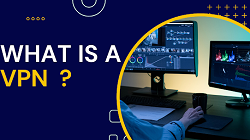A VPN (Virtual Private Network) Protects Your Online Privacy, Hijacks Your Traffic, And Location Anonymization To Make Hackers' Life Harder It is a simple software designed to However, it can also be used for many other things, such as fast and secure browsing.
But to be honest, it works. My simple, practical guide will teach you everything you need to know to get started.
What can a VPN do?
A VPN protects you in several important ways. VPN encrypts all data you send over the Internet. All internet traffic is encrypted when you connect to a VPN server.
Encryption prevents hackers from seeing sensitive information you enter on websites. B. Password.
This is especially important if you're on public WiFi, as cybercriminals can easily monitor your connection on public networks.
However, with a VPN, even if someone steals your data, they won't be able to decipher it or even make sense of it.
A VPN also protects your privacy
Some VPNs block malicious websites, ads, and trackers.
Malicious websites can download malware and trackers onto your device without your knowledge. A VPN with built-in protection can help prevent infections by blacklisting these sites before they do any harm.
This helps prevent malicious ads from infecting your device with malware.
How does a VPN work?
VPN routes all internet traffic to one of our encrypted servers.
For example, let's say you're in the UK and you're connecting to a server in the US. A VPN sends your traffic from the UK to the US and fully encrypts it.
Because it's encrypted, your ISP won't be able to track your online activity or where it came from.
From there, the VPN server will forward your traffic to the website you are visiting websites see the VPN server as the source of their traffic, not your device.
This means that the IP address of his VPN server will also be displayed instead of yours.
The best VPNs use thousands of servers and update their IP addresses regularly, so there's not enough time for a website to get blacklisted. increase.
Are VPNs legal?
The short answer is yes!
Countries such as China and Iraq prohibit the non-governmental use of VPNs. This means approved providers will likely meet anti-privacy requirements, making VPN services unreliable.
